The Best Cleaners for Granite Countertops Revealed

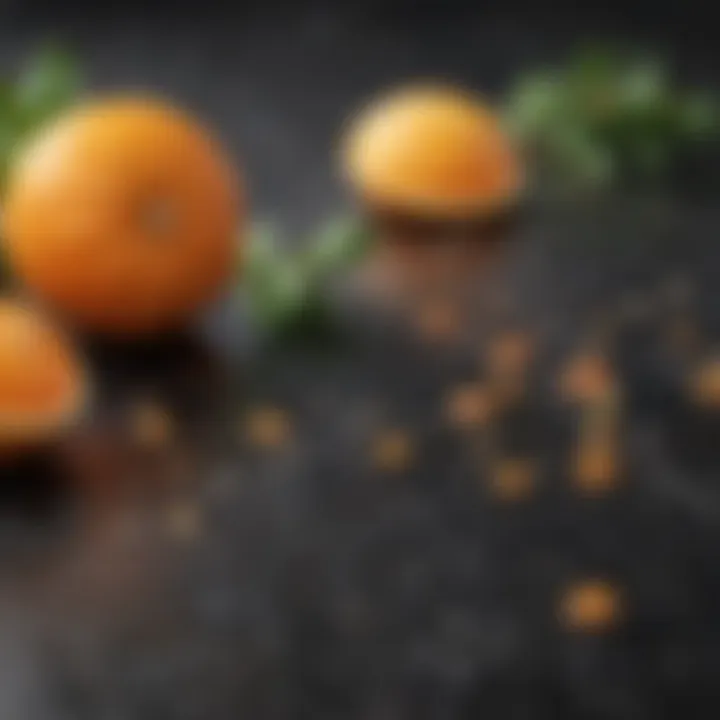
Intro
Granite countertops are a popular choice in kitchens and bathrooms, valued for their durability and aesthetic appeal. Maintaining their pristine condition requires careful attention to the cleaning products used. Many consumers face confusion surrounding which cleaners are safe and effective for granite. Choosing the right cleaner not only ensures the longevity of the surface but also maintains its visual appeal.
This guide aims to demystify the topic of granite countertop cleaning. It reviews the most effective cleaners on the market, highlights the ingredients that matter, and addresses common myths associated with their maintenance.
With the right knowledge, homeowners can make informed decisions that protect their investments. Discover how to achieve a sparkling, well-maintained granite countertop with our comprehensive recommendations.
Prelims to Granite Countertops Maintenance
Maintaining granite countertops effectively is crucial for homeowners and culinary enthusiasts alike. This material, prized for its durability and appearance, requires specific care to retain its beauty and functionality over time. The way one cleans and maintains these surfaces has direct implications on their longevity and overall aesthetic, making it essential to understand the best practices in granite care.
A granite countertop is an investment in a home. With proper maintenance, it can last for many years, even decades. This section will cover the various elements that contribute to effective granite care, focusing on understanding the material and the importance of proper cleaning.
Understanding Granite as a Material
Granite is an igneous rock composed mainly of quartz, feldspar, and mica. Its beauty comes from its unique patterns and colors, which result from the crystallization of magma beneath the Earth’s surface. It is known for its toughness, making it an ideal choice for kitchen countertops. However, despite its strength, granite is not impervious to damage. It can be affected by acids, heat, and even some cleaning agents. Therefore, understanding its composition is key to proper maintenance.
Granite is generally sealed to protect it from absorption of liquids and stains. The effectiveness of this seal can diminish over time, necessitating periodic resealing. This awareness will help in selecting the right cleaning practices and products to avoid compromising the seal integrity and overall durability of the stone.
Importance of Proper Cleaning
Cleaning granite countertops is not merely a routine chore but a fundamental component of its maintenance. Proper cleaning prevents buildup of grime, minimizes scratches, and protects the surface from harsh chemicals that may degrade the stone.
Using unsuitable cleaners can lead to etching or dulling of the surface. For instance, acidic cleaners can break down the granite’s sealer, leading to absorption issues. Additionally, neglecting regular cleaning may result in stubborn stains that require extensive effort to remove.
Characteristics of Effective Cleaners for Granite
Choosing the right cleaner for granite countertops is crucial. The cleaner must not only maintain the beauty of the granite but also ensure its longevity. Many factors contribute to the effectiveness of cleaners, including their chemical composition and application methods. Understanding these characteristics can help homeowners make informed decisions that protect their investment.
pH Balance Considerations
The pH level of a cleaner is a significant factor when selecting a product for granite. Granite is a natural stone that can be affected by acidic or alkaline substances. Ideally, granite cleaners should have a neutral pH level, around 7. This balance helps avoid damage to the stone's surface and maintains its appearance over time.
When a cleaner is too acidic, it can etch the surface of the granite, leading to dull spots. On the other hand, overly alkaline cleaners can leave a residue that attracts dirt, making future cleaning more challenging. Thus, looking for products labeled as pH-balanced is essential for effective granite care.
Presence of Abrasives and Their Effects
Abrasive ingredients in cleaning products may seem effective for removing tough stains. However, they can be detrimental to granite countertops. These particles can scratch the surface, diminishing its shine and leading to more significant maintenance issues down the line.
When evaluating a cleaner, check the label for the presence of any abrasive substances. Opt for cleaners that assure no abrasives are included. Instead, look for gentle cleaners that offer powerful cleaning without risking the integrity of the granite.
Avoiding Harsh Chemicals
Not all cleaners are created equal, especially when it comes to home use. Harsh chemicals like bleach and ammonia can cause unwanted damage to granite’s surface. Such substances can strip the sealer, leading to potential staining and degradation of the stone over time.
In addition to chemical composition, pay attention to the scent. Strong chemical odors often indicate that the cleaner may contain harsh ingredients. Choose environmentally friendly options that offer effective cleaning without compromising safety. This approach not only benefits your granite but also creates a healthier home environment.
Commercial Cleaners for Granite
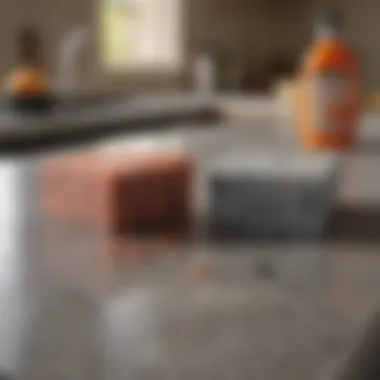
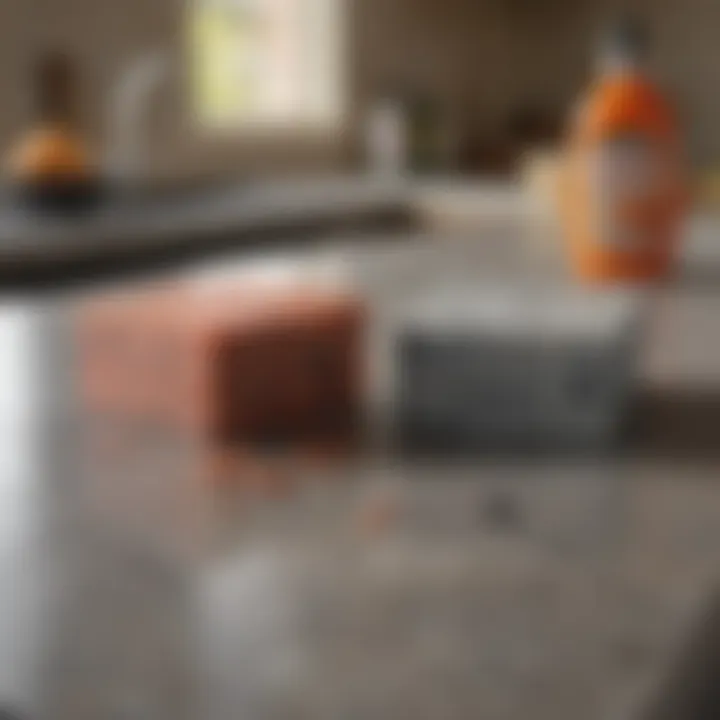
When it comes to maintaining the lustrous appeal of granite countertops, commercial cleaners play a significant role. These products offer specialized formulas designed to cater to the unique needs of granite surfaces. While some homeowners may resort to generic cleaning products, using cleaners specifically formulated for granite can prevent potential damage. They help preserve the stone’s natural beauty while ensuring hygiene and cleanliness.
Top Brands Reviewed
The market presents several brands that specialize in granite cleaning solutions. Each brand typically has distinct formulations that make them popular among consumers. Noteworthy names in the industry include:
- Weiman Granite Cleaner: Known for its streak-free shine, this cleaner effectively removes grime without harming the stone.
- StoneTech: Offers a range of products that not only clean but also protect the stone from stains and spills.
- Zep: Provides a powerful yet safe solution that is popular among both professional and home users.
- CLR: Specifically designed for tough stains, CLR modifies traditional cleaning methods by providing an effective stone-safe cleaner.
Using products from reputable brands ensures reliability in performance, reducing concerns over potential damage to the granite.
Ingredients to Look For
When selecting a commercial cleaner, it is crucial to scrutinize the ingredient list. Effective granite cleaners typically contain:
- Non-Abrasive Agents: These prevent scratches and maintain the smoothness of the countertop surface.
- pH-Neutral Solutions: They maintain the chemical balance necessary for cleaning granite without causing etching or dulling.
- Natural Ingredients: Many top brands emphasize using biodegradable and environmentally friendly components, which are safer for both the user and the surface.
Avoid products containing harsh chemicals like bleach or ammonia, as these can degrade the integrity of the stone over time.
User Guidelines and Best Practices
To maximize the effectiveness of commercial granite cleaners, adhering to specific user guidelines is essential. Here are some practices to consider:
- Read Labels Carefully: Ensure that the cleaner is labeled specifically for granite use. Not all surface cleaners are suitable for stone surfaces.
- Test in an Inconspicuous Area: Before applying the cleaner on the entire countertop, test it on a small, hidden section to ensure it does not affect the stone negatively.
- Use Soft Cloths or Microfiber: Avoid rough sponges or brushes that can scratch the granite. Soft cloths help maintain the surface's glossy finish.
- Follow Up with Water: After applying cleaner, rinse surfaces with water to remove residue, promoting cleanliness and shine.
- Store Properly: Keep the cleaner in a cool, dry place. Proper storage helps maintain the product’s efficacy for a longer duration.
By implementing these guidelines, users can ensure their granite countertops remain in pristine condition while prolonging their lifespan.
Commercial cleaners, when chosen wisely and applied consistently, serve as an investment in the longevity of granite surfaces.
Homemade Solutions for Granite Cleaning
Homemade solutions for cleaning granite countertops offer several advantages. They provide a safe alternative to commercial cleaners, which can sometimes include harsh chemicals. Homemade cleaners often use basic household ingredients that are readily available. This not only makes them cost-effective but also more environmentally friendly. Additionally, many people feel more comfortable using products they have created themselves, ensuring they know exactly what is being used on their surfaces.
These solutions can effectively remove dirt, grease, and stains while preserving the natural beauty of granite. However, it is essential to understand which ingredients are effective and how to use them correctly to avoid damaging the surface.
Effective Ingredients at Home
There are several effective ingredients at home that can be used to clean granite countertops. Common household items include:
- Water: The foundation of most cleaning solutions. It helps dilute other ingredients and aids in rinsing.
- Dish Soap: A gentle and effective cleaner for grease and grime. It is crucial to select a mild formula to prevent damage.
- White Vinegar: While it is excellent for many surfaces, vinegar should be used sparingly on granite due to its acidity.
- Baking Soda: Useful for scrubbing and stain removal. Its mild abrasiveness can help lift stains without scratching.
- Rubbing Alcohol: An excellent disinfectant that also helps with streak-free cleaning when diluted properly.
These ingredients not only serve their cleaning purpose but are often non-toxic, making them safe for both the users and the environment.
Mixing Ratios and Techniques
When making homemade cleaners, obtaining the right mixing ratios is important for effectiveness. A recommended recipe is:
- Basic Soap Solution: Mix a few drops of mild dish soap with a spray bottle filled with warm water. This is ideal for regular cleaning.
- Vinegar Solution: Combine one part white vinegar to three parts water for occasional deep cleaning. Remember to use it sparingly and follow up with a rinse of water to prevent any buildup.
- Baking Soda Paste: Mix baking soda with a little water to create a paste. Apply this to stubborn stains, allow it to sit for a few minutes, and then wipe off with a damp cloth.
- Disinfectant Spray: Combine equal parts of rubbing alcohol and water for a disinfecting solution. Spray lightly and wipe with a microfiber cloth for best results.
Using these techniques, you can tailor the cleaning solution to the specific challenge at hand, whether it is regular cleaning or tackling a particularly stubborn stain.
Safety Precautions when Using Homemade Cleaners
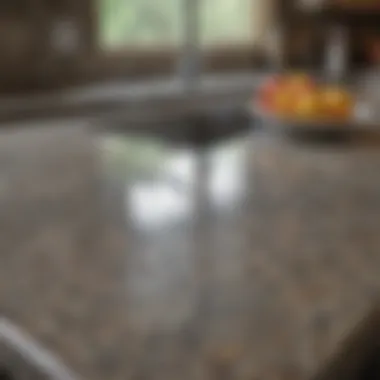
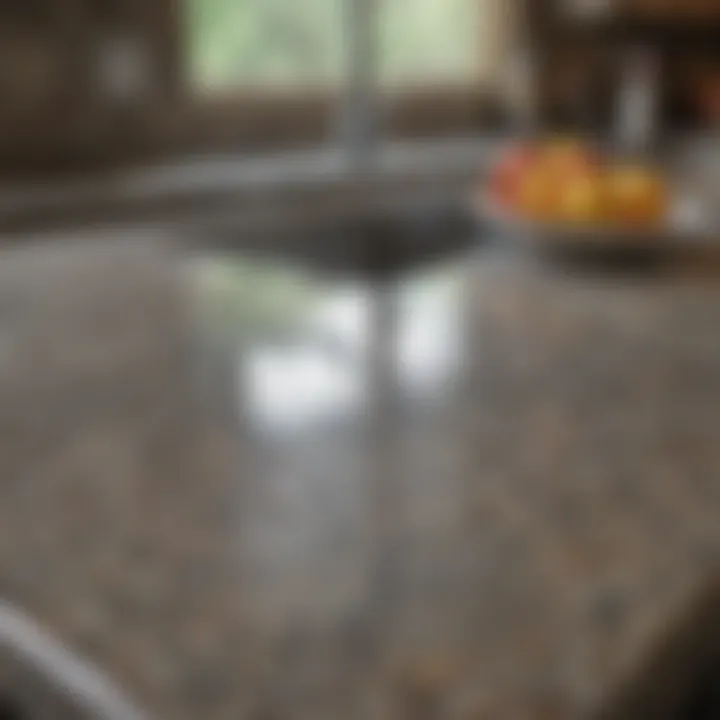
Safety should always be a priority when using any cleaning solution, including homemade ones. Here are some important precautions:
- Test First: Always conduct a spot test on an inconspicuous area before applying any cleaner onto the entire surface. This ensures that there are no adverse reactions.
- Avoid Abrasive Tools: Use soft cloths or sponges for cleaning. Avoid steel wool or other abrasive materials that can scratch the granite surface.
- Proper Rinsing: After using any cleaner, rinse the countertop with clean water to remove any residue. This helps maintain the surface’s polish and prevents buildup.
- Storage Considerations: Homemade solutions should be stored in labeled containers, away from children and pets.
By following these guidelines, you ensure both effective cleaning and the longevity of your granite countertops. It is crucial to remain vigilant and informed about what works best for this unique surface.
Best Practices for Cleaning Granite Countertops
Maintaining granite countertops requires more than just occasional cleaning. The right practices ensure that the surface remains beautiful and functional over time. By following best practices for cleaning, homeowners can avoid damage, preserve the stone's natural appeal, and extend the lifespan of their countertops. Consistency is key, along with using appropriate techniques and products designed specifically for granite.
Frequency of Cleaning
Granite countertops, while durable, do require regular care. Cleaning should be done on a daily basis to prevent the buildup of dirt and grime. For light spills, a simple wipe with a damp cloth suffices. For deeper cleaning, a more thorough approach should be taken at least once a week.
- Daily: Wipe with a soft cloth using warm, soapy water.
- Weekly: Use a designated granite cleaner to remove any stubborn residues.
- Monthly: Conduct a thorough inspection, checking for any wear or need for resealing.
This established routine not only keeps the surface clean but also protects against stains that could set in over time.
Step-by-Step Cleaning Process
A systematic cleaning process is essential for effectively maintaining granite countertops. Here is a simple yet efficient guide:
- Clear the Surface: Remove all items from the countertop to give full access.
- Dust Wipe: Use a soft, dry cloth to remove dust and loose particles.
- Prepare Cleaning Solution: Mix warm water with a few drops of pH-balanced liquid soap or a cleaning solution specific for granite.
- Wipe Down Countertops: Use a microfiber cloth to gently scrub the surface in a circular motion. Avoid excessive scrubbing as it can dull the finish.
- Rinse Thoroughly: After cleaning, rinse with a clean, damp cloth to remove soapy residue.
- Dry: Use a dry microfiber cloth to remove any remaining moisture and prevent streaking.
Using this step-by-step guide helps ensure not only cleanliness but also the safety of the stone's surface.
Post-Cleaning Care
Once the cleaning is complete, attention shifts to post-cleaning practices, which are equally important. Post-cleaning care involves ensuring the countertop does not lose its sheen or become compromised.
- Inspections for Damage: Check for any signs of wear or chips that may need attention.
- Resealing: Depending on usage and product quality, granite may need resealing every 6–12 months to avoid stains.
- Avoiding Heat and Scratches: Always use trivets or cutting boards to protect the surface from hot pots and sharp objects.
- Utilizing Coasters: For beverages, coasters should be used to prevent water rings and stains.
Implementing these care strategies not only enhances the appearance of the countertops but also promotes longevity and ease of maintenance.
Common Mistakes in Granite Care
Granite countertops are highly regarded for their beauty and durability. However, improper care can lead to irreversible damage. Recognizing and avoiding common mistakes is essential for maintaining the aesthetic and functional integrity of these surfaces. This section delves into the most frequent errors that homeowners make in granite care, underscoring their importance and long-term consequences.
Using Inappropriate Cleaners
One of the primary mistakes is using inappropriate cleaners. Many common household cleaning products contain acids or harsh chemicals that can erode the granite's surface over time. Products such as vinegar, lemon juice, or any citrus-based cleaners can harm the finish of the countertop. It is vital to opt for pH-neutral cleaners specifically designed for granite.
Key Points:
- Acidic and abrasive cleaners should be avoided.
- Always read labels to see if a product is suitable for granite.
- Consider using specially formulated products, like Granite Gold Daily Cleaner or Weiman Granite Cleaner.
"Using the wrong cleaner can lead to dullness and etching, both of which are costly to rectify."
Neglecting Resealing Practices
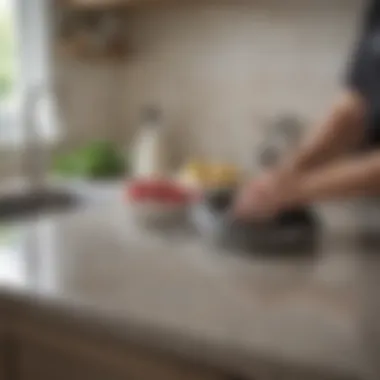
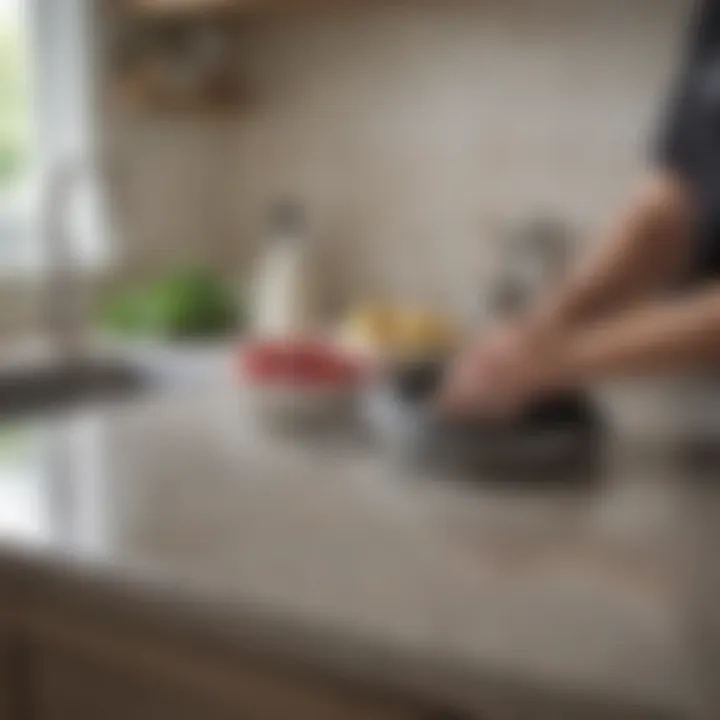
Another prevalent mistake is neglecting resealing practices. Granite is porous and can absorb spills, leading to stains. Sealing the granite creates a protective barrier. Many homeowners believe that sealing is a one-time task. However, it needs to be performed periodically. A yearly application is generally recommended, but the frequency can depend on the use and type of granite.
Key Points:
- Test for resealing needs by applying water to the surface. If it absorbs, it’s time to reseal.
- Use a high-quality granite sealer to ensure maximum protection.
- Proper sealing protects against stains and bacterial growth.
Ignoring Spills and Stains
Ignoring spills and stains is yet another mistake that can lead to lasting damage. Granite's durability does not make it impervious to staining. Quickly addressing spills, especially from substances like oil or wine, is crucial. Allowing these materials to sit can result in deep stains that are hard to remove.
Key Points:
- Wipe spills immediately with a soft cloth.
- For persistent stains, use a baking soda paste to lift the stain effectively.
- Educate family members about the importance of prompt clean-up to prevent deeper penetration.
By being aware of these common mistakes, one can preserve the longevity and beauty of granite countertops. A few mindful practices can make a significant difference. Proper cleaning, timely resealing, and immediate attention to spills can prevent costly repairs and keep your countertops looking their best.
The End and Recommendations
In reviewing the optimal cleaners for granite countertops, it becomes clear that maintenance is crucial for both functionality and aesthetics. The integrity of granite can be preserved through diligent care, reducing the risk of stains, scratches, and deterioration. By employing the appropriate cleaning methods and solutions, homeowners can ensure that their countertops remain visually appealing and functional for many years.
Summary of Best Practices
When considering effective cleaning for granite, a few key practices should be emphasized:
- Choose pH-neutral cleaners. These products do not disrupt the granite’s surface or the sealant.
- Avoid abrasive materials. Sponges or pads that are too rough can scratch the surface, leading to long-term damage.
- Implement regular cleaning schedules. Frequent upkeep prevents buildup of dirt and grime, making each cleaning easier.
- Always blot spills immediately. This prevents staining and makes it easier to clean the surface later.
- Reseal as needed. Depending on the usage and type of granite, regular resealing might be necessary to protect against staining.
Overall, utilizing these practices can maximize the lifespan of your countertops while maintaining their beauty.
Final Thoughts on Cleaner Choices
Ultimately, the decision on which cleaner to use should be informed by a well-rounded understanding of the material. Whether choosing a commercial product or crafting a homemade solution, the focus should always be on safety and effectiveness. Some recommended commercial cleaners include brands specialized in stone products, ensuring compatibility with granite's unique properties.
For homemade cleaners, simple ingredients like vinegar should be avoided due to their acidity, which can erode the sealant. Instead, consider mild dish soap diluted in water as a safe option.
"Proper care and appropriate products can vastly improve the longevity and appearance of your granite countertops."
For further reading on granite maintenance, please explore resources like Wikipedia, Britannica, or discussions on platforms like Reddit.
Links to Further Reading
Staying updated with the latest in granite care ensures that your knowledge remains current. Here are some links that provide further insight into granite maintenance and care:
- Wikipedia on Granite - For a comprehensive understanding of granite as a geological material, its properties, and uses.
- Britannica on Natural Stone - Explore the broader context of natural stones and their applications.
- Reddit Discussions on Granite Care - Engage with community insights and personal experiences related to granite cleaning and maintenance.
- Facebook Groups for Homeowners - Join groups that focus on home improvement and share experiences regarding granite care.
These resources can provide diverse perspectives and fresh ideas on cleaning granite and preserving its beauty.
Professional Cleaning Services
In some cases, engaging professional cleaning services might be necessary. These experts possess specialized knowledge and equipment that can address tough stains, deep-seated grime, or comprehensive maintenance needs that go beyond everyday cleaning.
Here are some factors to consider when looking into professional granite cleaning services:
- Experience - Ensure the service has a track record of working with granite surfaces.
- Reviews - Checking customer feedback can give insight into the quality of service.
- Techniques Used - Ask about the methods they employ and ensure they align with the best practices discussed.
- Guarantees - Look for services that offer satisfaction guarantees on their work.
Tip: Always communicate your specific concerns about your granite countertops to the cleaning service. This information helps them tailor their approach to your needs, ensuring optimal results.
Overall, these additional resources serve as essential tools for homeowners who wish to maintain the elegance and durability of their granite countertops.







